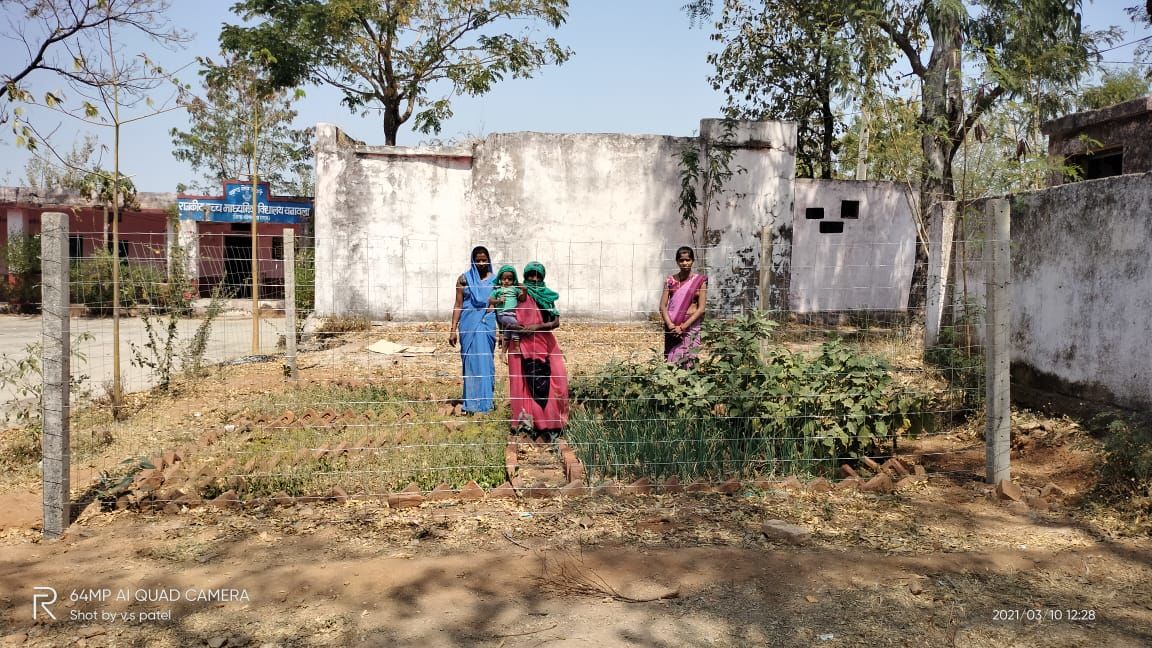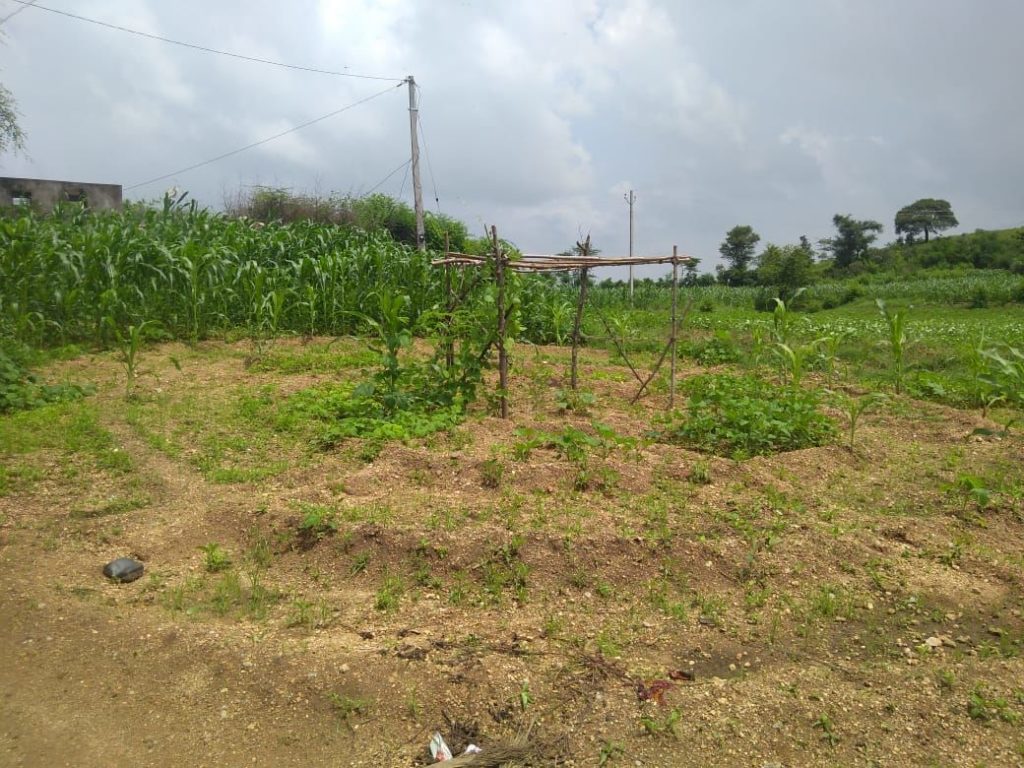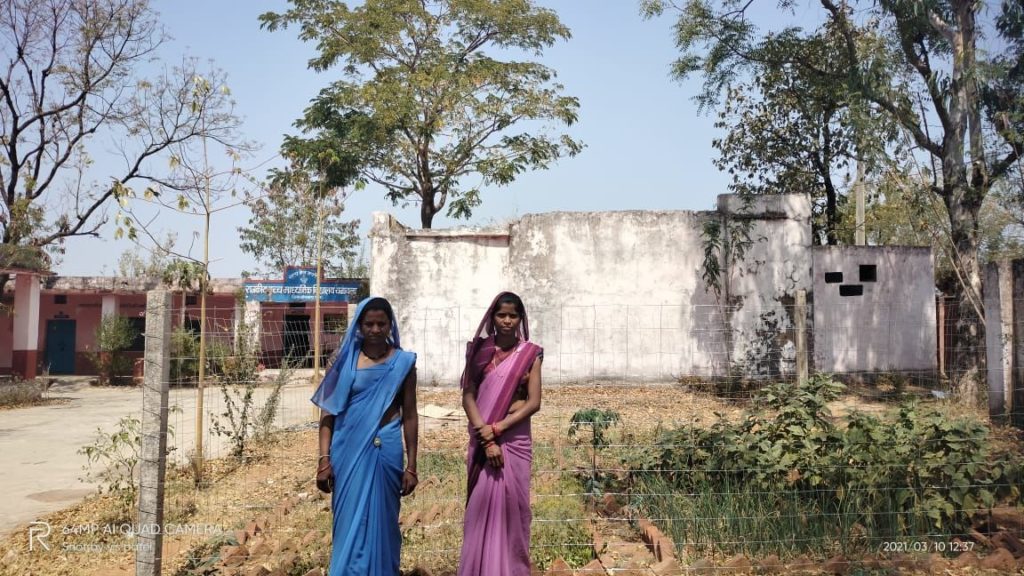Fighting tuberculosis with nutri-gardens
Rajasthan’s suposhan vatika scheme of creating gardens to grow fruits and vegetables as a means of tackling malnutrition can also play an important role in the central government’s programme to eradicate TB by 2025.


Nutri-garden in an anganwadi in Banswara, Rajasthan. All pics: Madhav Sharma
Jaipur, Rajasthan
In an inspired move last February, the suposhan vatika scheme to create nutri-gardens was launched in Udaipur, Rajasthan. The main aim of this scheme was to tackle the problem of malnutrition amongst children in the state. Soon hundreds of these nutri-gardens sprouted across Dausa, Banswara, Hanumangarh, Ganganagar, Udaipur, Pali, Rajsamand, Pratapgarh and Chittorgarh districts of the state.
This scheme to create vegetable and fruit gardens to supplement the diets of the needy, took root, benefitted many children, but soon dried up due to the COVID-19 pandemic and scarcity of water in the blistering summers of the desert state.
However, in the light of the central government’s programme to eradicate tuberculosis (TB) by 2025, the suposhan vatika scheme has assumed greater significance and these nutri-gardens are being revived in Rajasthan. Nutritional deficiency, as pointed out by health experts, is one of the leading causes of TB. And India is known as the TB capital of the world with an estimated 1.9 million new cases recorded every year.

“There are more TB cases in rural India than there are in the cities. This is because there is more poverty there and consequently lack of proper nutrition,” Varun Sharma, programme director, Association for Rural Advancement through Voluntary Action and Local Involvement (ARAVALI) told Gaon Connection. ARAVALI works with the Rajasthan government in implementing schemes to eradicate poverty in rural areas.
“Due to long standing malnutrition, people in rural areas are more vulnerable to TB,” Sharma pointed out. He reiterated that along with camps and campaigns to detect and treat tuberculosis it was imperative to ensure proper nutrition as well.
And this is where the role of nutri-gardens becomes imperative.
Also Read: Nutrition gardens offer hope and health to malnourished children in Rajasthan
Malnutrition in Rajasthan
Rajasthan ranks third after Assam and Bihar in terms of malnutrition. According to the Union health ministry’s National Family Health Survey- 4, 38.4 per cent of children in the state, below the age of five, weigh below average (that is 18 to 19 kgs for male children and 17 to 18 kgs for female ones); 23.4 per cent of them are wasted; 8.7 per cent are severely wasted; and 40.8 per cent are underweight. (The NFHS Survey-5 is yet to update the figures on Rajasthan).
Moreover, worrying statistics from the Government of India’s India TB Report-2021 reveal that there are 4,08,745 active tuberculosis cases in the state.
This poor physical development and lack of nutrition significantly increases the risk of developing TB. Health experts point out that if TB patients have no access to nutritious food after their treatment, the disease can resurface. So, for an eradication programme to be successful, ensuring healthy food is a must. Providing access to regular nutritious food can go a long way in combating the risk of TB in rural areas.
Suposhan vatikas
The suposhan vatika (nutri-gardens) scheme was launched in Rajasthan last year, just before the pandemic. Through it, fruit and vegetable gardens were set up at various places to supplement nutrition for children treated for malnutrition.
For instance, in Kotda block of Udaipur district, nutri-gardens were created around the homes of malnourished children. They not only consumed the nutritious vegetables and fruits, but their families could also supplement their incomes by selling off the extra produce. The scheme encouraged the planting and nurturing of pesticide-free vegetables so that each family could have some nutritious element in their daily meals.

“The gardens were a crucial step towards disease prevention. Carrots, spinach, peas were grown in the winter months that provided nutrition to malnourished children and their families,” Manju Parmar, deputy director of Integrated Child Development Services (ICDS), in Banswara, told Gaon Connection. “If these gardens are planned and developed with proper water facilities, cases of malnutrition and TB in Rajasthan can be controlled to a great extent,” she said.
ICDS, a central government scheme, disbursed Rs 10,000 per nutri-garden and with the help of workers of MGNREGA ( Mahatma Gandhi National Rural Employment Guarantee Act), these gardens were set up at anganwadi centres (government-run early childcare centres) across the state to grow vegetables and fruits conducive to the local weather conditions.
“A very good job has been done in Udaipur district where two thousand nine hundred and sixty eight vatikas were set up. There are some challenges with this programme but we shall work out their solutions,” Rajesh Verma, additional director (nutrition) at ICDS, Jaipur, told Gaon Connection. He said such gardens were planted in rural areas across districts that had a particularly high incidence of malnutrition, but admitted that the scheme had run into some trouble due to scarcity of water, and the COVID-19 lockdown.
However, before the gardens dried up, many households did benefit from the produce from the gardens in the winter months.
According to Parmar, in Banswara alone, ICDS constructed nutri-gardens at 149 anganwadi centres of 10 panchayat samitis. More than 300 malnourished children were registered in these anganwadis, of which just 73 children still fall into the malnourished category, she informed Gaon Connection.
“Nutri-gardens can be effective in curtailing malnutrition that increases the risk of TB. But, there is a need to develop a systemic and structural approach to fight it,” Chhaya Pachauli, director of Prayas, a non-profit that works on health issues in Rajasthan, told Gaon Connection. She said that more and more people should be brought under schemes that ensure food security, and government expenditure on such schemes should also be increased. “With adequate ration, the nutritional needs of the poor will be met,” she said.
This story has been published under the SATB Fellowship.
Read the story in Hindi here.

